What is certification?
What is it?
It is a need to meet a standard by setting up efficient processes to gain in performance. These processes will be evaluated by our auditors verifying that the specified requirements relating to your products, your processes, your systems are respected.
- There are voluntary certifications and regulatory certifications.
- The certification service is in charge of the evaluation and delivers the certificate which attests the respect of a precise reference frame.
The certification process is based on trust between 3 parties involved:
- Customers / users
- Suppliers / manufacturers
- Apave Tunisia
Your Benefits:
- Improve the quality of your products and services
- Grow your business
- Reduce costs and increase profits
- Stand out from your competitors
- Access export markets
- Win new customers and consolidate your activities
- Increased credibility and trust from your customers
- Optimize your processes and gain efficiency
- Ensure regulatory compliance with ease
You want to create your own repository or your own label ?
It is quite possible! Apave Tunisia has the necessary qualifications for a Certification Engineering service.
What is it?
You will work with a specialist in the field to develop your project. He or she will accompany you through the voluntary certification process, allowing you to develop a reference system that meets certain standards
Your Benefits:
Certification: Demonstrate that requirements are met in your management systems. Guarantee the conformity of your organization to international standards
Labeling: Establish a customized reference system for your private organization, guaranteeing the quality and conformity of a product/service.
Outsourced internal audit
Whether you are a construction company, a distribution company or a service company, all sectors of activity included, we are able with our methodologies and our processes to conduct your internal audits according to your standards by relying on our network of qualified and specialized auditors.
Management system
The management system is a set of principles, rules and procedures that enable an organization to manage its activities effectively and efficiently. This system is composed of several elements, including the organization's objectives, policies, procedures, instructions and control measures.
In addition to providing companies with a solid and transparent policy thanks to standards established by world-renowned experts, a management system is a guarantee of performance, time savings and productivity, as well as a gateway to the international market.
This service is performed under COFRAC accreditation (according to ISO 17021-1) for the certification of management systems.
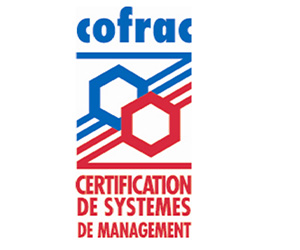 |
ISO 9001 - 14001 - 45001 - 50001 : Accreditation n° 4-0552 - scope available on the website www.cofrac.fr |
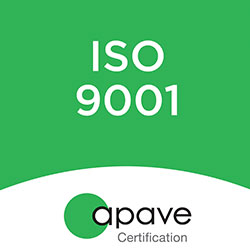

What is it?
Improving customer satisfaction through a quality management system
ISO 9001 is an international standard that aims to implement a quality management system in companies and organisations of all sizes, and in all sectors of activity, with the objective of improving customer satisfaction.
Increasing your performance and competitiveness, satisfying your customers, involving your employees, and being part of a long-term quality approach: these are the main benefits of the ISO 9001 standard for which Apave Tunisie certifies you.
The requirements
- - Management involvement
- - Customer orientation
- - Staff involvement
- - The process approach
- - The system approach
- - A continuous improvement approach
- - Fact-based decision making
- - Mutually beneficial relationships with suppliers
Target
ISO 9001 certification is aimed at any public or private organisation, whatever its size or sector of activity.
Features
- - Carrying out internal audits: the requirements of the standard require the organisation to audit its own quality system. This is a task that enables the relevance and, above all, the effectiveness of the processes to be verified.
- - Involvement of customers in quality management: the direct involvement of customers in the improvement of the quality policy is a strong argument for improving customer satisfaction.
- - Benefit from an independent assessment: certification by an independent body such as Apave Certification provides a real guarantee of quality and credibility.
Periodicity
The ISO 9001 certificate is valid for 3 years. Renewal of the certification requires a renewal audit, which is carried out by a different auditor.
Procedures for obtaining certification
Resulting from a voluntary approach, the 9001 certification requires that your quality management system has been in place for 6 months, that it has been audited internally at least once and that a management review has been carried out.
The benefits of ISO 9001: Quality Management
- - Increased customer confidence in meeting their needs and expectations
- - Cost reduction
- - Involvement and motivation of staff
- - Progress through a continuous improvement process
- - Removal of trade barriers
- - International recognition
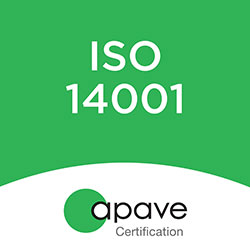

What is it?
ISO 14001 is a voluntary international standard for implementing an Environmental Management System in companies and organisations of all sizes and in all sectors of activity. Putting the environment at the heart of your action and being able to prove your impact and its evolution is the challenge of implementing an environmental management system.
The requirements
- - Determine your environmental impact
- - Develop an environmental policy
- - Establish objectives
- - Take into account regulatory requirements
- - Establish processes that respect the commitments expressed
- - Take the necessary actions to improve environmental performance
Target
ISO 14001 certification is aimed at any public or private organisation, whatever its size or sector of activity, wishing to control and reduce its environmental impact.
The characteristics
- The requirements of an EMS are divided into 18 environmental requirements and 6 chapters, including:
- - General requirements
- - Environmental policy
- - Planning
- - Implementation of actions to meet the environmental policy
- - Controls and corrective actions
- - Management review
Periodicity
The ISO 14001 : Environmental Management System certification is valid for 3 years, subject to the completion of annual surveillance audits.
Renewal of the certification requires a renewal audit, which is performed by a different auditor.
Benefits of ISO 14001: Environmental Management
- - Identify the environmental aspects of your activities, products and services
- - Implement a real environmental policy
- - Control the environmental impact of your activities by reducing nuisance
- - Compliance with regulatory requirements
- - Transparent communication with staff, local residents, customers, environmental associations, elected representatives, insurers, etc.
- - Enhancement of your image
- - Opening up to new markets by proving your involvement in the preservation and protection of the environment on a global scale
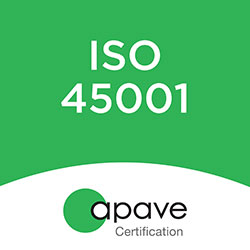

What is it?
ISO 45001 is the first international standard on occupational health and safety management systems (OHSMS). ISO 45001 provides organizations with a structured approach to improving the health and safety of their workers, preventing occupational accidents and illnesses, and reducing the risk of exposure to occupational risk factors.
The benefits
- - The ISO 45001 standard certifies that your company has a quality, safety and environment (QSE) policy that respects the legal requirements and preventions on the management of health and safety at work.
- - A high level structure (HLS) based on standards, facilitating the transition to ISO 45001 and guaranteeing a continuous improvement approach.
- - Adaptable to all company structures regardless of their size, activity or degree of control of OHS issues.
- - One of the most requested ISO standards internationally, it is the first to take into account health and safety at work.
- - Reduction in the number of work-related accidents.
- - A better image with your employees
Objectives
- - Reduce and structure risks through a global management.
- - Reduce work-related accidents
- - Optimize costs (insurance premiums, optimal activity ...) and improve productivity (absenteeism rate, staff turnover ...) of your company
The differences between ISO 45001 and OHSAS 18001
- - Contrary to ISO 18001, which focuses on hazard management, ISO 45001 is based on the relationship between the organization and its business environment.
- - While OHSAS 18001 is based on business procedures, ISO 45001 has a business process approach.
- - Like OHSAS 18001, ISO 45001 takes into account not only the risks but also the opportunities.
- - ISO 45001, unlike OHSAS 18001, incorporates the stakeholders or interested parties.
However, an OHSAS 18001 certified system will have an easier time migrating to ISO 45001.
Target
Construction, production and service companies, all sectors combined. (manager, QSE manager, OHS manager, maintenance manager, human resources manager).
Periodicity
The ISO 45001 certification is valid for 3 years, under the conditions of audits.
Then, a renewal audit performed by a different auditor is necessary to validate the compliance with the requirements of the standard and to renew the certificate.
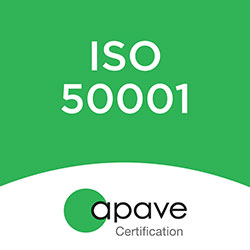

The ISO 50001 energy management system standard is an international standard that defines the requirements for implementing an energy management system. It was first published in 2011 by the International Organization for Standardization (ISO). This standard optimizes your company's energy performance through better management and allows your organization to be compliant with the energy efficiency policy as part of a CSR approach.
Objectives
- - Continuously improve energy performance through a better energy policy
- - Reduce energy-related costs
- - Reduce greenhouse gas emissions
- - Meet its CSR policy commitments through objectives and action plans
Target
Energy producer, energy consuming company, public or semi-public organization (energy management: boiler rooms), social landlord (management of building stock), Director or site managers for small structures.
Periodicity
The ISO 50001 certification is valid for 3 years, under the conditions of audits.
Then, a renewal audit performed by a different auditor is necessary to validate the compliance with the requirements of the standard and to renew the certificate.
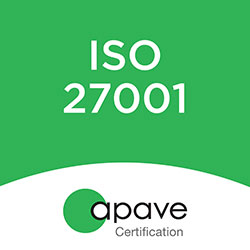

Objective
- This certification meets the requirements of organizations in terms of data protection and compliance with certain regulations (RGPD ...) of the company.- Optimize its information systems security management system.
- Implementation of security practices.
Target
Companies with sensitive data (General Management, Quality Manager, CISO (Information Systems Security Manager))Periodicity
This certification is valid for three years and is accompanied by annual surveillance audits.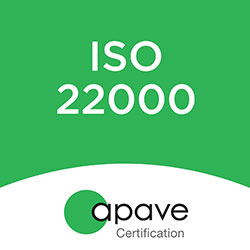

Service
Apave controls food safety risks throughout the supply chain, thanks to its experts from the agricultural and foodApave's experts in the agricultural and food industry conduct interviews with the parties involved, on-site inspections and internal audits of your company.
You will then receive a certification audit report with a corrective action plan to comply with the ISO 22000 standards.
Target
Any agricultural producer, plant or animal, packaging, storage, distribution and public or professional catering organization.Periodicity
The ISO 22000 certification is valid for 3 years, with one renewal audit and two annual surveillance audits.Benefits
Prove to your customers and employees that your organization has a management system that covers the safety of your foodSteps and process
- 1. Initial application
1. Initial application
- 2. Planning
2. Planning
- 3. Audit
3. Audit
- 4. Decision
4. Decision
- 5. Edition
5. Edition
- 6. Follow-up audit
6. Follow-up audit
- 1. Initial application
1. Initial application
- 2. Planning
2. Planning
- 3. Audit
3. Audit
- 4. Decision
4. Decision
- 5. Edition
5. Edition
- 6. Follow-up audit
6. Follow-up audit
- 1. Initial application
1. Initial application
- 2. Planning
2. Planning
- 3. Audit
3. Audit
- 4. Decision
4. Decision
- 5. Edition
5. Edition
- 6. Follow-up audit
6. Follow-up audit
Label
Labels attest the quality of a product or service. Labels can be voluntary or mandatory, and are issued by independent organizations. Labels allow consumers to make informed choices based on objective criteria.
Need a label for your product, but don't know where to start? Don't worry, we'll walk you through it step by step. The first thing to do is to determine the type of label you need. Apave provides you with existing and customized labels for your private organization, guaranteeing the quality and conformity of a product/service.
Benefits:
The labeling of your organization:
- Adds value to your production through the guarantee of the quality of your services and products.
- Distinguishes you from your competitors
- Enhances your image with your customers.
- Sometimes allows you to access new markets
- Benefit from a better visibility
Existing labels:
Several labels exist today, the best known being the Safe & Clean label which reassures your consumers since the Covid epidemic. However, other labels are created every year such as :
- HS2® : Helps elderly people to stay at home in the best conditions
- Safe & clean : Taking into account the conditions of cleanliness of a company
- RGPD commitment: Taking into account the regulation on data protection.
- Biodiversity signature: Taking into account the issues related to biodiversity
- Longtime label: Guarantees a product that is easy to repair and has a long service life.
FOCUS
Label RSE 26000
Global performance
| The Corporate Social Responsibility (CSR) 26000 label is a label issued by an independent third party. It allows companies to demonstrate their commitment to sustainable development and social equity, a subject that is of increasing interest to companies. The CSR 26000 label helps you to prove your seriousness and your involvement in your CSR approach. |
Why choose
Apave Tunisia?

Our quality-oriented approach

Our unique approvals and accreditations


